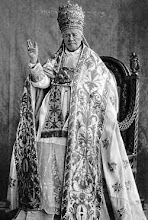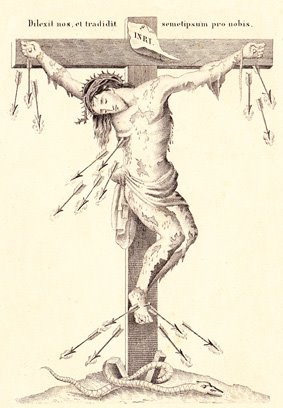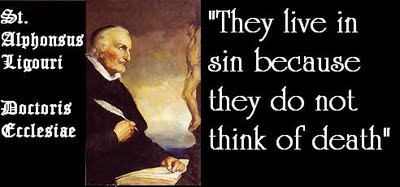
Taken from "The Glories of Mary" by Saint Alphonsus Liguori
Mary is prompt to help those who invoke her
We are poor unfortunate children of Eve. As guilty before God as she, and condemned to the same penalty, we are doomed to wander in this valley of tears as exiles, weeping over our many afflictions of body and soul. But happy is he who can turn in the midst of these sorrows to the comforter of the world, to the great Mother of God, and who can devoutly and humbly pray to her: "Blessed is the man that hears me, and that watches daily at my gates" (Prov 8:34). Blessed, says Mary, is he who listens to my counsels and who watches at the gates of my mercy and invokes my intercession and aid.
Holy Church indicates quite clearly how attentively and confidently we are to have recourse constantly to this loving protectress. As a matter of fact, she commands us to have a special devotion to Mary. During the year, a certain number of feasts are to be celebrated in her honor. One day a week is to be specially dedicated to her. In the daily Office, all priests and religious are to invoke her in the name of all Christendom, and three times a day all the faithful are to greet her at the sound of the Angelus bell.
A deeper insight into the mind of the Church is gotten from the fact that in all public calamities the Church wants us to turn to Mary through novenas, special prayers, processions, and visits to her shrines. This is the way Mary wants it. She wants us constantly to seek and invoke her help. Not that she is begging for it, because all the homage we can show her falls far short of what she deserves. But as Saint Bonaventure says, she wants us to increase our confidence and in that way receive greater consolation and help.
Saint Bonaventure also says that Ruth is a figure of Mary because the very name Ruth means seeing and hastening. When Mary sees our miseries, she hastens to help us with her mercy. Novarinus adds that, because of her great desire to do us good, Mary does not delay. She is not a greedy guardian of her graces but the Mother of Mercy, and so she cannot help distributing the treasure of her graces as soon as she can.
Oh, how prompt this good mother is to help those who invoke her: "Your breasts are like twin fawns" (Cant 4:5). In explaining this passage Richard of Saint Lawrence says that, just as fawns are known for the speed with which they run, so also are the breasts of Mary quick to give the milk of mercy to any who ask for it. Richard assures us that Mary dispenses her mercy to everyone who asks for it, even though his prayer be only a simple Hail Mary.
Novarinus claims that the Blessed Virgin not only runs, but actually flies to help whoever calls on her. And he assures us that whenever Mary dispenses mercy she imitates God. Just as Our Lord immediately flies to the rescue of those who ask his help, mindful of his promise, "Ask and you shall receive" (Jn 16:24), so too, whenever Mary is invoked she actually hurries to help the one who prays. "God uses wings and immediately flies to help his servants; and the Blessed Virgin also dons wings to fly to our aid."
From this, we can readily understand how Mary is the woman mentioned in the Apocalypse, of whom it is said: "And there were given to the woman the two wings of the great eagle, that she might fly into the wilderness" (Apoc 12:14). Father Ribera, S.J., explains this passage by saying that the two wings are the love wherewith Mary is ever flying toward God. "She has the wings of an eagle, because she flies out of love for God." But Blessed Amadeus has another explanation, one more in accord with our own opinion, and says that the two wings indicate the speed with which Mary always flies to the aid of her children, a speed that surpasses even that of the Seraphim: "At a most rapid speed, surpassing even the Seraphim, Mary, as a mother, flies everywhere to aid her own."
In Luke's Gospel, we read that when Mary went to visit Elizabeth and shower that entire family with grace, she did not tarry but made the whole journey rapidly: "Now in those days Mary arose and went with haste into the hill country" (Lk 1:39). Nothing is said in the Gospel about her also returning with haste.
From the fifth chapter of the Canticle of Canticles, we get the impression that Mary's hands are used to the lathe. Richard of Saint Lawrence explains that the use of the lathe makes difficult work easy and also enables the artisan to work swiftly. He explains the passage in Canticles (5:14) thus: "As the art of working a lathe is the quickest of all, so is Mary quicker than all the saints in doing good."
Mary has the greatest desire to console everybody. No sooner is she invoked, says Blosius, than she immediately hears the prayers and graciously helps the petitioner. That is why Saint Bonaventure rightly calls her "the salvation of all who call on her." He means to say that in order to be saved it is enough merely to call on Mary. According to Richard of Saint Lawrence, Mary is always found ready to help everyone who prays. And Bernardine de Bustis tells us she is more eager to do us favors than we are to receive them. "Mary is more anxious to do us good than we are to receive her benefits."
The fact that we have committed many sins should not lessen our confidence that Mary will hear us when we fly to her. Mary is the Mother of Mercy and there is no place for mercy where there is no misery to be relieved. Just as a good mother does not hesitate to apply remedies to the ulcerous wounds of her son, even though the treatment is annoying and nauseating, so too Mary cannot abandon us when we have recourse to her, even though the wounds of our sins be nauseating and revolting. This thought is the sentiment of Richard of Saint Lawrence who says: "For this good mother does not despise sinners any more than any good mother would despise her child who is afflicted with a horrible disease, for this reminds her why she became the Mother of Mercy. Where there is no misery, there is no demand for mercy." This is the very point that Mary wished to bring home to Saint Gertrude when Mary opened her cloak to receive all who turned to her. At the same time, the saint was told that all the angels of heaven constantly protect Mary's clients from the assaults of hell.
The Blessed Virgin's compassion and love are so great that she does not wait for our prayers before helping us. The Book of Wisdom expresses this beautifully: "She hastens to make herself known in anticipation of men's desires" (6:13). Saint Anselm applies these words to Mary and says she forestalls those who desire her protection. By this we are to understand that she implores many favors for us from God before we even pray to her!
Precisely for this reason, says Richard of Saint Victor, is Mary called "beautiful as the moon" (Cant 6:9), because in flying to the aid of those who call on her, Mary is as swift as the moon in its course. Swifter, in fact, because she is so concerned about our welfare that she even anticipates our prayers. And, adds Richard, it is not possible for this benign queen to behold the want of any soul without immediately assisting it.
Mary, even when living in this world, showed at the marriage feast of Cana the extraordinary compassion she would exercise for us later in heaven - that compassion which would make her come to our aid even before we ask her. In the second chapter of Saint John, we read that Mary noticed the distress and embarrassment of the bride and groom because the supply of wine was running low. Without being asked, and listening only to the dictates of her compassionate heart (which can never notice the distress of others without feeling for them), Mary prevailed upon Jesus to relieve the situation. She merely mentioned to him: "They have no wine" (Jn 2:3). To spare the couple embarrassment, but even more to content the tender heart of his mother, Jesus ordered the water pots to be filled. Then he miraculously transformed the water into wine. Arguing from this fact, Novarinus remarks: "If Mary comes to the rescue so quickly, without being asked, what more will she do if she is asked?"
If anyone still doubts that Mary will hasten to his help when asked, let him feel rebuked by the words of Innocent III who says: "Who has ever called upon her from the dark night of sin, and was not relieved?" Blessed Eutychian asks the same question: "Who has ever faithfully implored your all-powerful aid and was abandoned by you?" Such a thing has never happened and never will happen. "I would be perfectly satisfied," says Saint Bernard, "if anyone who ever called on you and was not helped by you would never even speak about you and praise your mercy." But such a case has never occurred.
"Sooner," says the devout Blosius, "would heaven and earth be destroyed than Mary would fail to help anyone who asked for help, provided he did so with a good intention and with confidence in her." Saint Anselm, to increase our confidence, says this: "When we have recourse to Mary, not only may we be sure of her protection, but often we will be heard by Mary more speedily than if we had recourse to Jesus, our Savior." The reason he gives is that it is the office of Jesus as judge to punish, but it is Mary's role, as mother, to be merciful. He says this, not because Mary's power to save us is more powerful than her son's, for we know that Jesus is our only Savior, the only one who through his merits has brought about our salvation. But when we remember that Jesus is our judge, and that it is his province as judge to punish ungrateful sinners, we may become apprehensive and lack the confidence we need to be heard. Surely our confidence is greater when we go to Mary, whose only office as Mother of Mercy is to help us and defend us as our advocate. To substantiate this, we have the beautiful words of Nicephorus: "Many things are asked of God and not obtained. Many things are asked of Mary and obtained - not because she is more powerful, but because God has arranged this to honor her."
Saint Bridget heard Our Lord make a most sweet and consoling promise. In the fiftieth chapter of the first book of her Revelations we read how the saint one day heard Jesus say to his mother: "There is no prayer of yours that will not be heard. My dear Mother, ask for whatever you wish. I will refuse you nothing. And I also promise to hear the prayers of all who for love of you ask me for grace, even though they be sinners, provided they want to amend." Saint Gertrude heard our Divine Redeemer make the same promise to his mother, namely, that through his omnipotence he had granted Mary the power to reconcile all sinners who called on her for help in whatever way it should suit Mary to help them.
Let everyone, then, with the fullest and completest confidence, make this well-known prayer of Saint Bernard his own: "Remember, o most gracious Virgin Mary, that never was it known that anyone who fled to your protection was left unaided." Therefore, forgive me, O Mary, if I say that I will not be the first unfortunate creature who has ever had recourse to you and was not abandoned.























Who is artist?
ReplyDelete